National
Jesse Jackson names Rainbow PUSH Coalition successor
White House praised civil rights icon
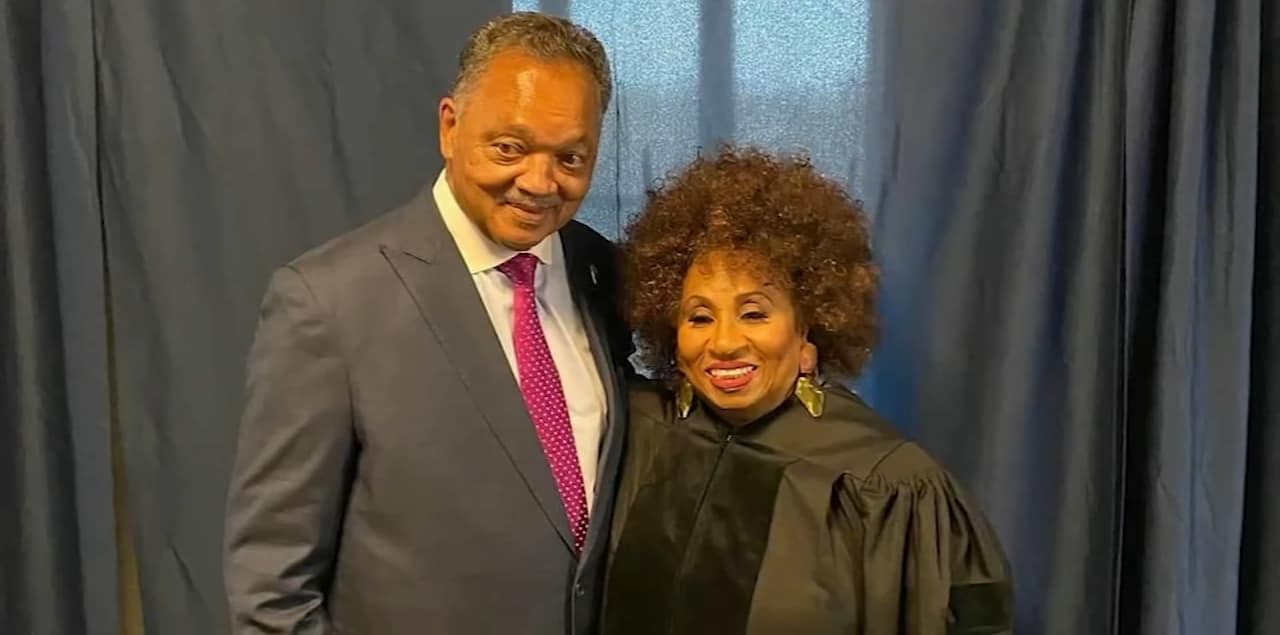
During the annual meeting of the Rainbow PUSH Coalition civil rights organization he founded and has headed for over 5 decades, Rev. Jesse Jackson, Sr., formally named Rev. Dr. Frederick Haynes III of the Friendship West Baptist Church in Dallas as his successor.
The Rainbow PUSH Convention was held on Sunday at the Apostolic Church of God in the Windy City’s Woodlawn neighborhood. Also in attendance was Vice President Kamala Harris, the event’s special keynote speaker, who had arrived at Chicago’s Midway Airport earlier on Sunday morning.
“I am looking forward to this next chapter where I will continue to focus on economic justice, mentorship and teaching ministers how to fight for social justice. I will still be very involved in the organization and am proud that we have chosen Rev. Dr. Haynes as my successor,” Jackson said in a statement released by the organization.
Haynes has served as the senior pastor of Friendship West Baptist for the past four decades.
“Rev. Jackson has been a mentor and I have been greatly influenced and inspired by this game-changing social justice general, international ambassador for human rights, and prophetic genius. Sadly, justice and human rights are under attack in the nation and around the world. The work of Rainbow PUSH is as necessary as ever and I am committed to standing on the shoulders of Rev. Jackson and continuing the fight for freedom, peace, equity, justice and human rights,” Haynes said.
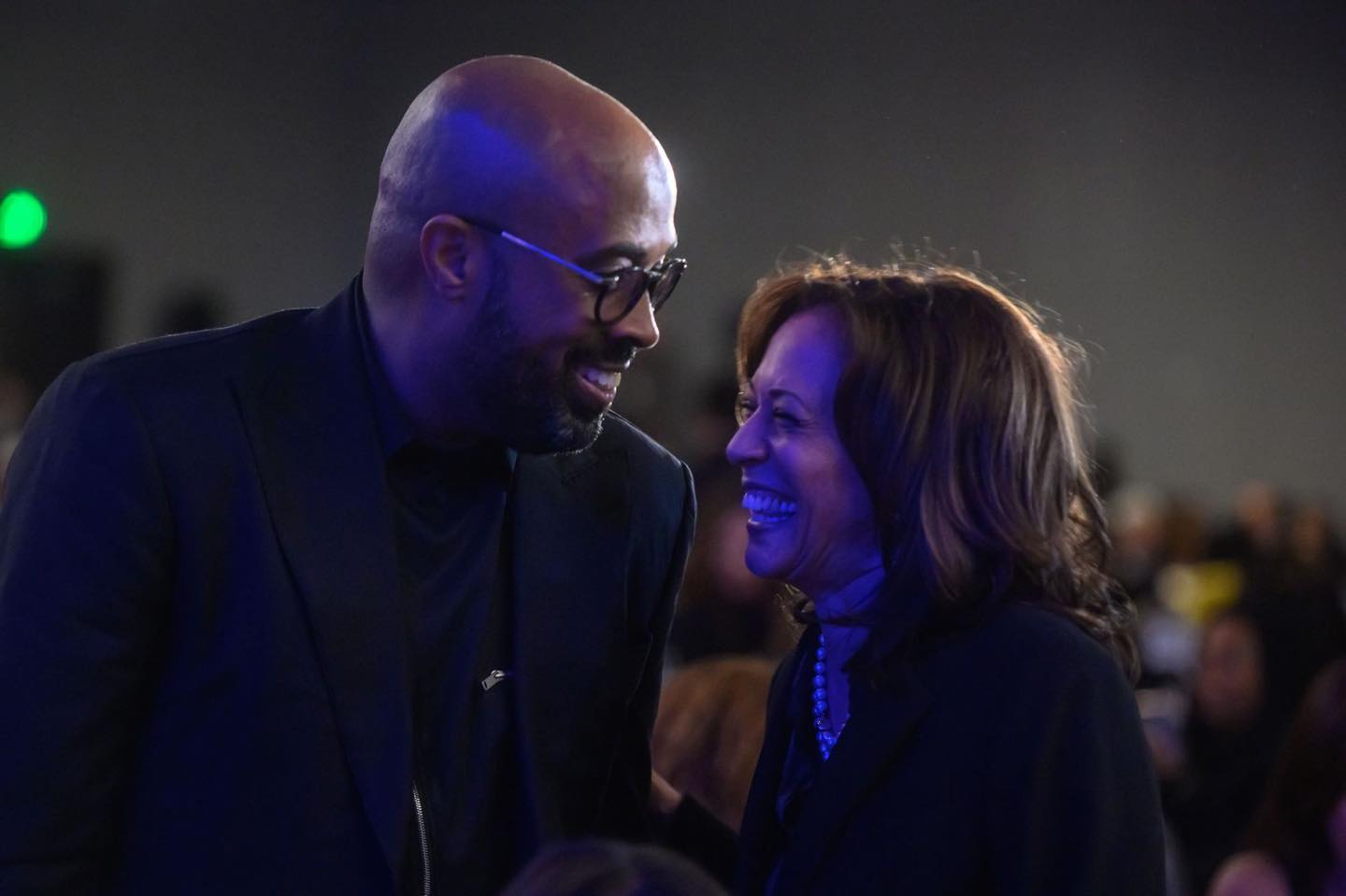
The White House released a statement from President Joe Biden, who has had a longtime working relationship and friendship with the civil rights leader for over 40 years:
“The promise of America is that we are all created equal in the image of God and deserve to be treated equally throughout our lives. While we’ve never fully lived up to that promise, we’ve never fully walked away from it because of extraordinary leaders like Rev. Jesse Jackson, Sr.
“Throughout our decades of friendship and partnership, I’ve seen how Rev. Jackson has helped lead our nation forward through tumult and triumph. Whether on the campaign trail, on the march for equality, or in the room advocating for what is right and just, I’ve seen him as history will remember him: a man of God and of the people; determined, strategic, and unafraid of the work to redeem the soul of our nation.
“Jill and I are grateful to Rev. Jackson for his lifetime of dedicated service and extend our appreciation to the entire Jackson family. We look forward to working with the Rainbow PUSH Coalition as he hands the torch to the next generation of leadership, just as we will continue to cherish the counsel and wisdom that we draw from him.”
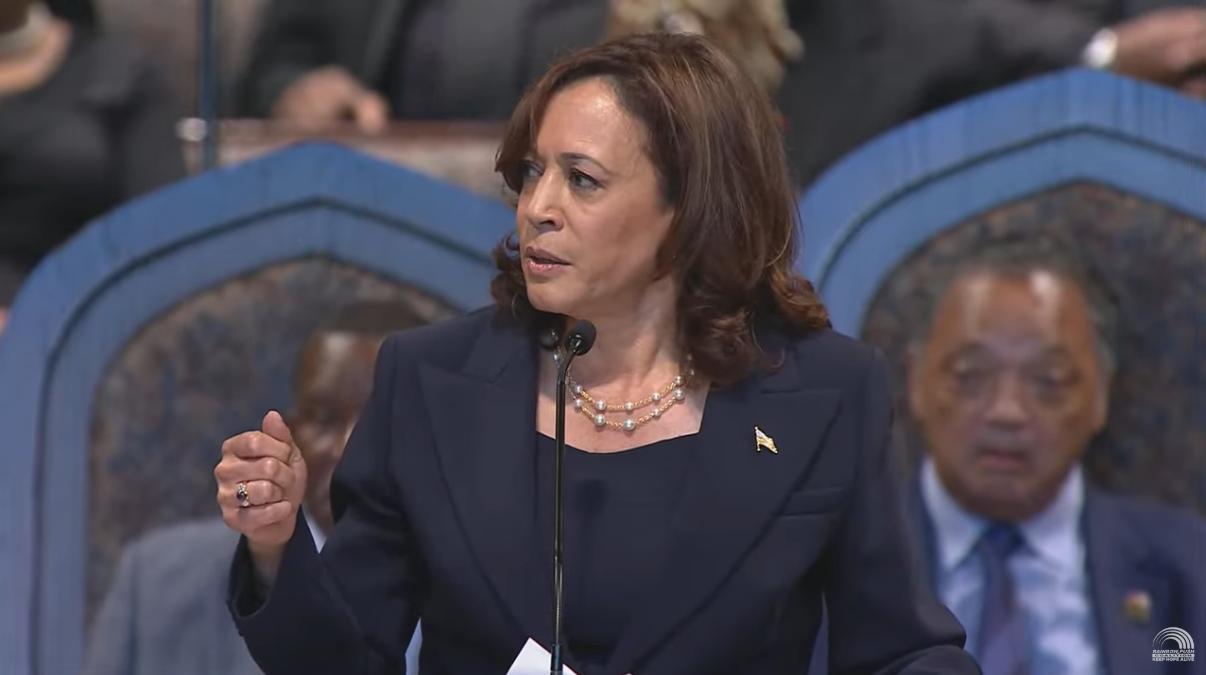
Jacquelyne Germain, political reporter from the Chicago Sun-Times and the pool reporter accompanying the vice president, reported notable quotes made during Harris’ speech included:
“So today, we celebrate one of America’s greatest patriots. Someone who deeply believes in the promise of our country.”
“At the core of Rev.’s work is the belief that the diversity of our nation is not a weakness or an afterthought, but instead, our greatest strength.”
“Early on, he even had the audacity to name this coalition the National Rainbow Coalition.
He defined the rainbow. He was one of the first to define the rainbow. A coalition to push the values of democracy and liberty and equality and justice, not from the top down but from the bottom up and the outside in. He has built coalitions that expanded who has a voice and a seat at the table.”
“Across our country, we are witnessing hard fought hard won freedoms under full on attack by extremist, so called leaders. These extremists have an agenda, an agenda to divide us as a nation, an agenda to attack the importance of diversity and equity and inclusion and the unity of the Rainbow Coalition.”
“These extremists banned books in the year of our Lord 2023. They ban books and prevent the teaching of America’s full history. All the while they refuse reasonable gun safety laws to keep our children safe. Understand what’s happening.”
“Fueled by the love of our country, just as Rev. has done his entire career, let us keep hope alive”
Jackson, 81, was an early supporter and a protégé of the iconic civil rights leader, the late Rev. Dr. Martin Luther King, Jr., starting his work with King participating in the three Selma to Montgomery marches, held in 1965 along the 54-mile highway from Selma, Ala., to the state capital of Montgomery.
King gave Jackson a role in the Southern Christian Leadership Conference (SCLC), sending Jackson to head the Chicago branch of the SCLC’s economic arm, Operation Breadbasket, which he later was appointed president of in 1967.
At 6:01 p.m. on April 4, 1968, King, SCLC leadership, Jackson and other civil rights activists who had gathered at the Lorraine Motel in Memphis, Tenn., to stand in solidarity with striking African American city sanitation workers, were on the balcony outside King’s room 306 when a shot rang out. King was leaning over the balcony railing in front of his room and was speaking with Jackson who was in the parking lot beneath the balcony.
The bullet struck the civil rights leader in his face rendering him unconsciousness and he was rushed to St. Joseph’s Hospital, where doctors opened his chest and performed cardiopulmonary resuscitation. King never regained consciousness and died at 7:05 p.m. whereupon in the aftermath, post-assassination rioting broke out in major cities across the nation.
On April 3, 2018, on the eve of the 50th anniversary of the assassination, Jackson spoke with a reporter from Scripps News about the events of that night:
In the years following the death of King, tensions between Jackson and King’s successor as chairman of the SCLC, Rev. Ralph Abernathy, created a rift that escalated until early December 1971, when Jackson, his entire Breadbasket staff and 30 of the 35 SCLC board members resigned and began planning a new organization which formed the basis for People United to Save Humanity (Operation PUSH) which officially began operations on Dec. 25, 1971, based in Chicago.
In 1984 Jackson organized the Rainbow Coalition and resigned his post as president of Operation PUSH to run for president. He became the second Black American to run a national campaign for president in a major party’s primary.
Twelve years previously in 1972, Shirley Chisholm, a Democratic representative from New York’s 12th Congressional District, centered on Brooklyn’s Bedford–Stuyvesant neighborhood, was the first Black person, male or female, to run for president within a major party, and Chisholm became the first woman to run for the Democratic Party’s presidential nomination.
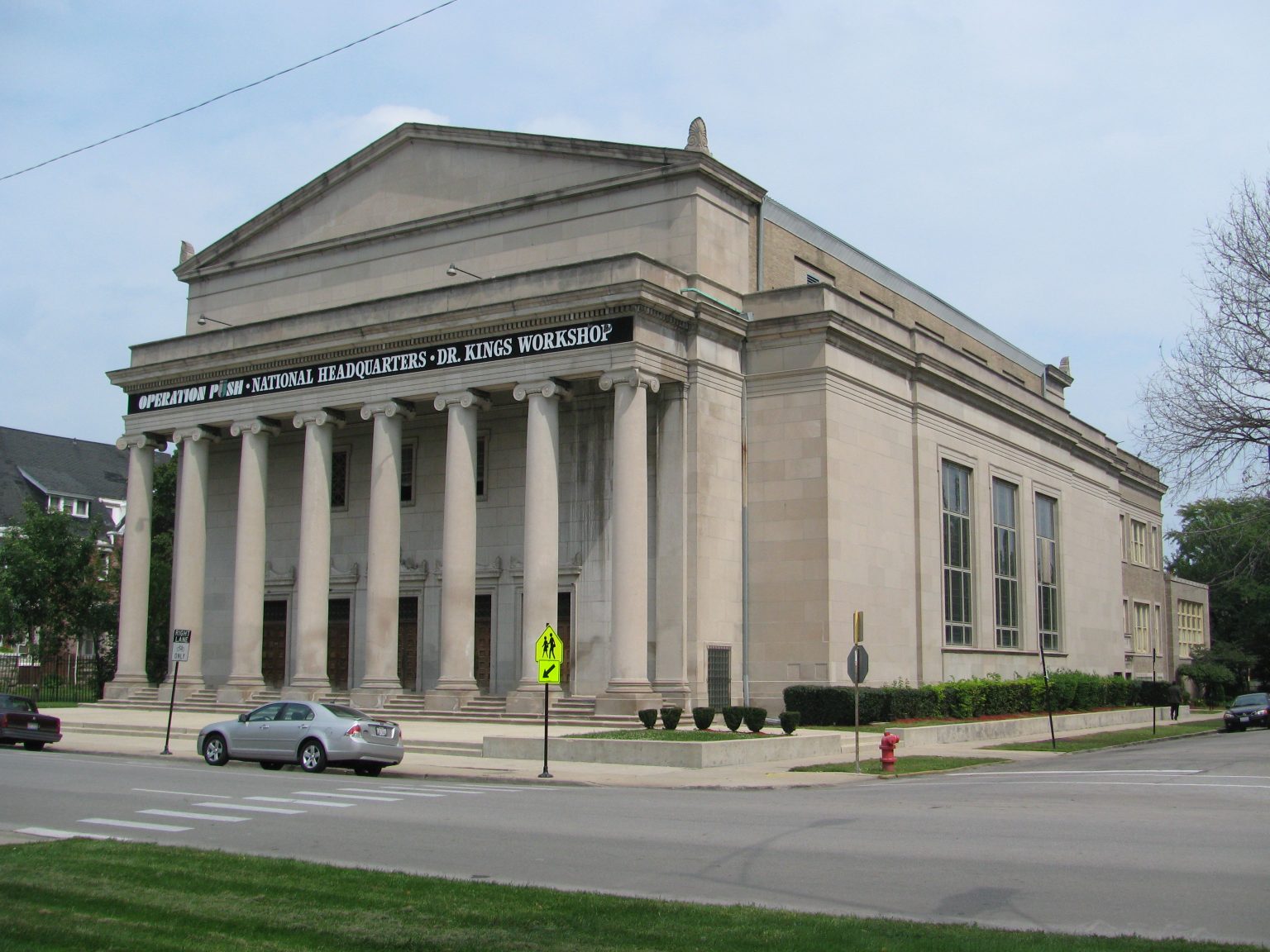
The Democratic primary campaign races for president was a national political watershed moment for the country’s LGBTQ community. It marked the first time that all of the party’s leading candidates had sought the endorsement of LGBTQ organizations.
At the national Democratic convention held at the Moscone Center in San Francisco in 1984, Jackson became the first candidate to deliver a speech to mention gays and lesbians. In what became known as his “Rainbow Coalition” speech, Jackson said:
[…] “Our party is emerging from one of its most hard fought battles for the Democratic Party’s presidential nomination in our history. But our healthy competition should make us better, not bitter. We must use the insight, wisdom, and experience of the late Hubert Humphrey as a balm for the wounds in our party, this nation and the world. We must forgive each other, redeem each other, regroup and move one. Our flag is red, white and blue, but our nation is a rainbow — red, yellow, brown, Black and white — and we’re all precious in God’s sight.
America is not like a blanket — one piece of unbroken cloth, the same color, the same texture, the same size. America is more like a quilt: Many patches, many pieces, many colors, many sizes, all woven and held together by a common thread. The white, the Hispanic, the Black, the Arab, the Jew, the woman, the native American, the small farmer, the businessperson, the environmentalist, the peace activist, the young, the old, the lesbian, the gay and the disabled make up the American quilt.” […]
Jackson decided to make a second run for the presidency in 1987.
On Oct. 11, 1987, at the National March on Washington for Lesbian and Gay Rights, which was thematically honing in on the HIV/AIDS crisis that had enveloped the LGBTQ community, among the speakers at the march rally, held on the grounds of the U.S. Capitol, was presidential candidate Jackson along with gay U.S. Reps. Barney Frank and Gerry Studds, both Democrats from Massachusetts; former National Organization for Women President Eleanor Smeal and United Farm Workers Union President Cesar Chavez.
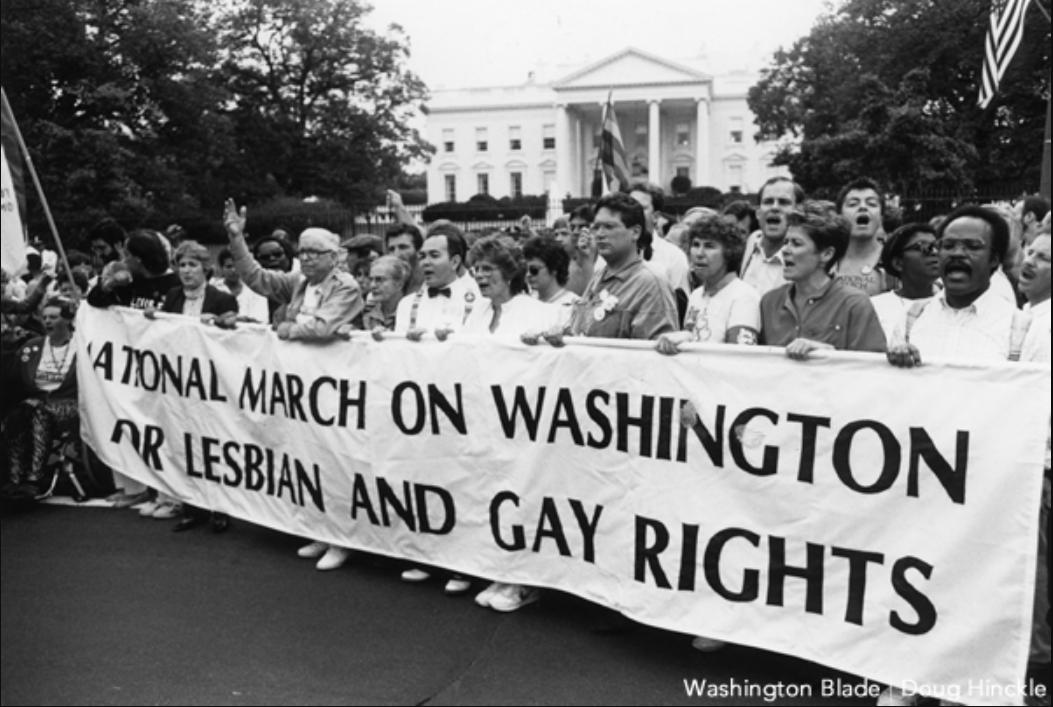
In his remarks, Jackson told the crowd of approximately 300,000:
“We gather today to say that we insist on equal protection under the law for every American, for workers’ rights, women’s rights, for the rights of religious freedom, the rights of individual privacy, for the rights of sexual preference. We come together for the rights of all American people.”
During the 1987 primary campaign, Jackson would often spar with the party’s frontrunner, Massachusetts Gov. Michael Dukakis over the governor’s apparent lack of proactive concern over the HIV/AIDS pandemic that had gripped the LGBTQ community with thousands dying from the disease. Additionally, there were many leaders in the LGBTQ community who viewed Dukakis as homophobic.
Former Washington Post writer Howard Kurtz, in his April 15, 1988, column reported that during a March primary debate, Jackson drew cheers from a vocal gay contingent at the debate when he spoke of the AIDS “hysteria.” Recalling the March on Washington, he said: “I saw people in their wheelchairs who are dying of AIDS . . . Not one of the {Reagan administration} officials would come downstairs and shake their hand.”
Kurtz also noted:
“Dukakis is someone who has gone out of his way to hurt us,” said David Taylor, president of Manhattan’s Gay and Lesbian Independent Democrats, a 400-member club that has endorsed Jackson.
The contest for gay voters is almost a microcosm of the larger campaign: While Jackson moves gays with his eloquent speeches on gay rights, Dukakis takes a more measured approach and finds himself pinned down on specifics from his tenure as governor, Kurtz reported.
After the 1988 campaign, Jackson, now living in D.C., ran for the office of “shadow senator” when the position was created in 1991, serving until 1997, when he did not run for reelection. This unpaid position was primarily a post to lobby for D.C. statehood.
While he declared that he would not be a candidate again for president, he and frontrunner Arkansas Gov. Bill Clinton had a series of public disagreements after Jackson called for the creation of “new democratic majority.”
On April 26, 1992, Jackson and Clinton had a 40-minute meeting and emerged to announce that they were both committed to defeating Bush in the general election. Asked if he was ready to endorse Clinton, Jackson said,
“Well, if he wins the nomination of our party, he would be well on his way. We need a new president and we need a new direction. We cannot afford any more of what George Bush represents,” the New York Times reported.
The National Rainbow Coalition held a leadership conference June 13, 1992, entitled “Rebuild America: 1992 and Beyond,” Jackson and Clinton appearing together spoke about their plans for the future of the U.S.
Over the course of the 1990s Jackson devoted his time and efforts to stemming the rising gun violence, along with efforts to further advance civil rights for the disenfranchised minority communities. He also worked on the campaign for his son Jesse Jackson, Jr., who was elected to the U.S. House of Representatives as congressman from Illinois’s 2nd congressional district who served from 1995 until his resignation in 2012.
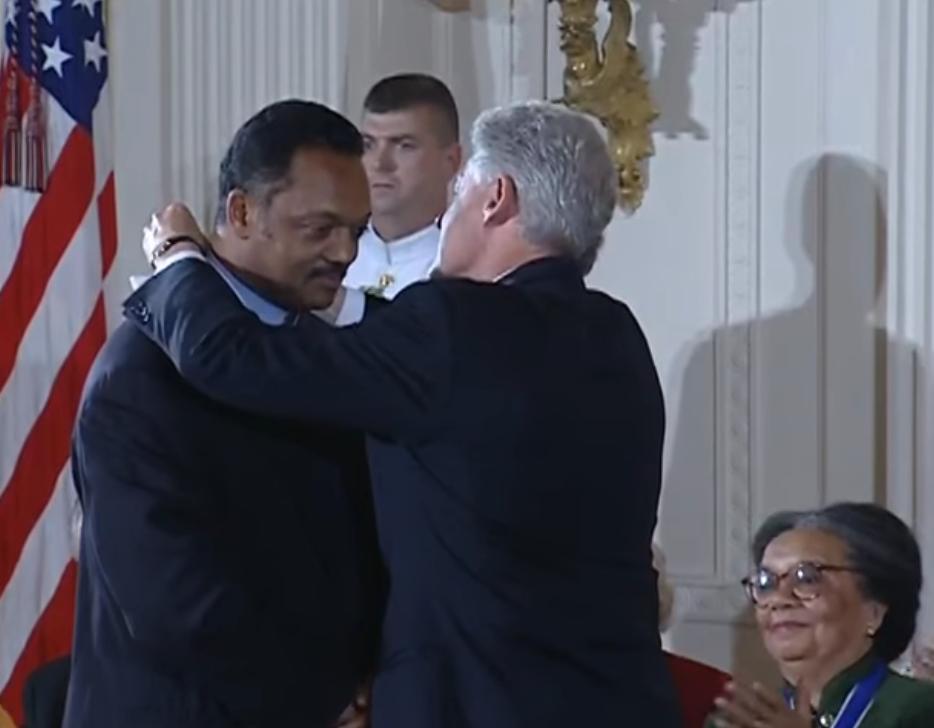
On March 1, 2000, Jackson announced his support of and endorsed Clinton’s vice president, Al Gore, for the latter’s presidential run. After George W. Bush won, Jackson was a vocal opponent of the Bush administration’s policies.
During the course of the rest of the decade Jackson was active in social and cultural issues often being present at numerous protests. One notable incident occurred in November 2006, after a white comedian, former Seinfeld actor Michael Richards launched into onstage racist tirade at the Laugh Factory in Hollywood directed at a Black audience member.
CNN later reported that Richards had called Jackson a few days after the incident to apologize; Jackson accepted Richards’ apology and met with him publicly as a means of resolving the situation. Jackson also joined Black leaders in a call for the elimination of the “N-word” throughout the entertainment industry.
Jackson was an early supporter of then-U.S. Sen. Barack Obama (D-Ill.) who announced his candidacy in 2007 for president. In 2012, he praised then-President Obama for his decision to support same-sex marriage and compared the fight for marriage equality to the fight against slavery and the anti-miscegenation laws that once prevented interracial marriage, a position that brought immediate criticism from conservatives — especially evangelical and Pentecostal Black pastors.
After the infamous shooting death on Feb. 26, 2012, in Sanford, Fla., of 17-year-old Trayvon Martin that brought about a national protests and in which his killer, George Zimmerman was later acquitted under Florida’s so-called ‘stand-your-ground’ law, Jackson refused to accept it, comparing the decision to the acquittals in the cases of Emmett Till and Medgar Evers decades earlier.
In the next few years he would also be vocal about the injustices and deaths of young Black males at the hands of primarily white law enforcement officials.
Jackson continued to actively work on behalf of civil rights causes as exemplified during the administration of President Donald Trump calling out some of the more blatant examples of white supremacy seemingly endorsed by Trump.
As the 2020 election neared, Jackson said that Trump had left “African Americans in the deepest hole with the shortest rope” and predicted “African Americans — and particularly African-American women — will vote overwhelmingly for Joe Biden.”
A few weeks ago, Jackson announced his plans to step down as the leader of Rainbow PUSH, following 64 years of civil rights activity within this movement. Aides said that his decision was brought about in consideration of his advanced age as well as health complications — Jackson was diagnosed with Parkinson’s disease in 2017, and was hospitalized twice in 2021, after testing positive for COVID-19 and then following a head injury.
Related:
Rainbow Push Coalition: Celebration of Rev. Jackson’s life’s work:
U.S. Military/Pentagon
4th Circuit rules against discharged service members with HIV
Judges overturned lower court ruling

A federal appeals court on Wednesday reversed a lower court ruling that struck down the Pentagon’s ban on people with HIV enlisting in the military.
The conservative three-judge panel on the 4th U.S. Circuit Court of Appeals overturned a 2024 ruling that had declared the Defense Department and Army policies barring all people living with HIV from military service unconstitutional.
The 4th Circuit, which covers Maryland, North Carolina, South Carolina, Virginia, and West Virginia, held that the military has a “rational basis” for maintaining medical standards that categorically exclude people living with HIV from enlisting, even those with undetectable viral loads — meaning their viral levels are so low that they cannot transmit the virus and can perform all duties without health limitations.
This decision could have implications for other federal circuits dealing with HIV discrimination cases, as well as for nationwide military policy.
The case, Wilkins v. Hegseth, was filed in November 2022 by Lambda Legal and other HIV advocacy groups on behalf of three individual plaintiffs who could not enlist or re-enlist based on their HIV status, as well as the organizational plaintiff Minority Veterans of America.
The plaintiffs include a transgender woman who was honorably discharged from the Army for being HIV-positive, a gay man who was in the Georgia National Guard but cannot join the Army, and a cisgender woman who cannot enlist in the Army because she has HIV, along with the advocacy organization Minority Veterans of America.
Isaiah Wilkins, the gay man, was separated from the Army Reserves and disenrolled from the U.S. Military Academy Preparatory School after testing positive for HIV. His legal counsel argued that the military’s policy violates his equal protection rights under the Fifth Amendment’s Due Process Clause.
In August 2024, a U.S. District Court sided with Wilkins, forcing the military to remove the policy barring all people living with HIV from joining the U.S. Armed Services. The court cited that this policy — and ones like it that discriminate based on HIV status — are “irrational, arbitrary, and capricious” and “contribute to the ongoing stigma surrounding HIV-positive individuals while actively hampering the military’s own recruitment goals.”
The Pentagon appealed the decision, seeking to reinstate the ban, and succeeded with Wednesday’s court ruling.
Judge Paul V. Niemeyer, one of the three-judge panel nominated to the 4th Circuit by President George H. W. Bush, wrote in his judicial opinion that the military is “a specialized society separate from civilian society,” and that the military’s “professional judgments in this case [are] reasonably related to its military mission,” and thus “we conclude that the plaintiffs’ claims fail as a matter of law.”
“We are deeply disappointed that the 4th Circuit has chosen to uphold discrimination over medical reality,” said Gregory Nevins, senior counsel and employment fairness project director for Lambda Legal. “Modern science has unequivocally shown that HIV is a chronic, treatable condition. People with undetectable viral loads can deploy anywhere, perform all duties without limitation, and pose no transmission risk to others. This ruling ignores decades of medical advancement and the proven ability of people living with HIV to serve with distinction.”
“As both the 4th Circuit and the district court previously held, deference to the military does not extend to irrational decision-making,” said Scott Schoettes, who argued the case on appeal. “Today, servicemembers living with HIV are performing all kinds of roles in the military and are fully deployable into combat. Denying others the opportunity to join their ranks is just as irrational as the military’s former policy.”
New York
Lawsuit to restore Stonewall Pride flag filed
Lambda Legal, Washington Litigation Group brought case in federal court

Lambda Legal and Washington Litigation Group filed a lawsuit on Tuesday, challenging the Trump-Vance administration’s removal of the Pride flag from the Stonewall National Monument in New York earlier this month.
The suit, filed in the U.S. District Court for the Southern District of New York, asks the court to rule the removal of the Pride flag at the Stonewall National Monument is unconstitutional under the Administrative Procedures Act — and demands it be restored.
The National Park Service issued a memorandum on Jan. 21 restricting the flags that are allowed to fly at National Parks. The directive was signed by Trump-appointed National Park Service Acting Director Jessica Bowron.
“Current Department of the Interior policy provides that the National Park Service may only fly the U.S. flag, Department of the Interior flags, and the Prisoner of War/Missing in Action flag on flagpoles and public display points,” the letter from the National Park Service reads. “The policy allows limited exceptions, permitting non-agency flags when they serve an official purpose.”
That “official purpose” is the grounds on which Lambda Legal and the Washington Litigation Group are hoping a judge will agree with them — that the Pride flag at the Stonewall National Monument, the birthplace of LGBTQ rights movement in the U.S., is justified to fly there.
The plaintiffs include the Gilbert Baker Foundation, Charles Beal, Village Preservation, and Equality New York.
The defendants include Interior Secretary Doug Burgum; Bowron; and Amy Sebring, the Superintendent of Manhattan Sites for the National Park Service.
“The government’s decision is deeply disturbing and is just the latest example of the Trump administration targeting the LGBTQ+ community. The Park Service’s policies permit flying flags that provide historical context at monuments,” said Alexander Kristofcak, a lawyer with the Washington Litigation Group, which is lead counsel for plaintiffs. “That is precisely what the Pride flag does. It provides important context for a monument that honors a watershed moment in LGBTQ+ history. At best, the government misread its regulations. At worst, the government singled out the LGBTQ+ community. Either way, its actions are unlawful.”
“Stonewall is the birthplace of the modern LGBTQ+ rights movement,” said Beal, the president of the Gilbert Baker Foundation. The foundation’s mission is to protect and extend the legacy of Gilbert Baker, the creator of the Pride flag.
“The Pride flag is recognized globally as a symbol of hope and liberation for the LGBTQ+ community, whose efforts and resistance define this monument. Removing it would, in fact, erase its history and the voices Stonewall honors,” Beal added.
The APA was first enacted in 1946 following President Franklin D. Roosevelt’s creation of multiple new government agencies under the New Deal. As these agencies began to find their footing, Congress grew increasingly worried that the expanding powers these autonomous federal agencies possessed might grow too large without regulation.
The 79th Congress passed legislation to minimize the scope of these new agencies — and to give them guardrails for their work. In the APA, there are four outlined goals: 1) to require agencies to keep the public informed of their organization, procedures, and rules; 2) to provide for public participation in the rule-making process, for instance through public commenting; 3) to establish uniform standards for the conduct of formal rule-making and adjudication; and 4) to define the scope of judicial review.
In layman’s terms, the APA was designed “to avoid dictatorship and central planning,” as George Shepherd wrote in the Northwestern Law Review in 1996, explaining its function.
Lambda Legal and the Washington Litigation Group are arguing that not only is the flag justified to fly at the Stonewall National Monument, making the directive obsolete, but also that the National Park Service violated the APA by bypassing the second element outlined in the law.
“The Pride flag at the Stonewall National Monument honors the history of the fight for LGBTQ+ liberation. It is an integral part of the story this site was created to tell,” said Lambda Legal Chief Legal Advocacy Officer Douglas F. Curtis in a statement. “Its removal continues the Trump administration’s disregard for what the law actually requires in their endless campaign to target our community for erasure and we will not let it stand.”
The Washington Blade reached out to the NPS for comment, and received no response.
Massachusetts
EXCLUSIVE: Markey says transgender rights fight is ‘next frontier’
Mass. senator, 79, running for re-election

For more than half a century, U.S. Sen. Edward Markey (D-Mass.) has built a career around the idea that government can — and should — expand rights rather than restrict them. From pushing for environmental protections to consumer safeguards and civil liberties, the Massachusetts Democrat has long aligned himself with progressive causes.
In this political moment, as transgender Americans face a wave of federal and state-level attacks, Markey says this fight in particular demands urgent attention.
The Washington Blade spoke with Markey on Tuesday to discuss his reintroduction of the Trans Bill of Rights, his long record on LGBTQ rights, and his reelection campaign — a campaign he frames not simply as a bid for another term, but as part of a broader struggle over the direction of American democracy.
Markey’s political career spans more than five decades.
From 1973 to 1976, he served in the Massachusetts House of Representatives, representing the 16th Middlesex District, which includes the Boston suburbs of Malden and Melrose, as well as the 26th Middlesex District.
In 1976, he successfully ran for Congress, winning the Democratic primary and defeating Republican Richard Daly in the general election by a 77-18 percent margin. He went on to serve in the U.S. House of Representatives for nearly four decades, from 1976 until 2013.
Markey in 2013 ran in the special election to fill an open Senate seat after John Kerry became secretary of state in the Obama-Biden administration. Markey defeated Republican Gabriel E. Gomez and completed the remaining 17 months of Kerry’s term. Markey took office on July 16, 2013, and has represented Massachusetts in the U.S. Senate ever since.
Over the years, Markey has built a reputation as a progressive Democrat focused on human rights. From environmental protection and consumer advocacy to civil liberties, he has consistently pushed for an expansive view of constitutional protections. In the Senate, he co-authored the Green New Deal, has advocated for Medicare for All, and has broadly championed civil rights. His committee work has included leadership roles on Senate Foreign Relations Committee and the Senate Health, Education, Labor and Pensions (HELP) Committee.
Now, amid what he describes as escalating federal attacks on trans Americans, Markey said the reintroduction of the Trans Bill of Rights is not only urgent, but necessary for thousands of Americans simply trying to live their lives.
“The first day Donald Trump was in office, he began a relentless assault on the rights of transgender and nonbinary people,” Markey told the Blade. “It started with Executive Order 14168 ‘Defending women from gender ideology extremism and restoring biological truth to the federal government.’ That executive order mandates that federal agencies define gender as an unchangeable male/female binary determined by sex assigned at birth or conception.”
He argued that the executive action coincided with a sweeping legislative push in Republican-controlled statehouses.
“Last year, we saw over 1,000 anti trans bills across 49 states and the federal government were introduced. In January of 2026, to today, we’ve already seen 689 bills introduced,” he said. “The trans community needs to know there are allies who are willing to stand up for them and affirmatively declare that trans people deserve all of the rights to fully participate in public life like everyone else — so Trump and MAGA Republicans have tried hard over the last year to legislate all of these, all of these restrictions.”
Markey said the updated version of the Trans Bill of Rights is designed as a direct response to what he views as an increasingly aggressive posture from the Trump-Vance administration and its GOP congressional allies. He emphasized that the legislation reflects new threats that have emerged since the bill’s original introduction.
In order to respond to those developments, Markey worked with U.S. Rep. Pramila Jayapal (D-Wash.) to draft a revised version that would more comprehensively codify protections for trans Americans under federal law.
“What we’ve added to the legislation is this is all new,” he explained, describing how these proposed protections would fit into all facets of trans Americans’ lives. “This year’s version of it that Congresswoman Jayapal and I drafted, there’s an anti-trans bias in the immigration system should be eliminated.”
“Providers of gender affirming care should be protected from specious consumer and medical fraud accusations. The sexual and gender minority research office at the National Institutes of Health should be reopened and remain operational,” he continued. “Military discharges or transgender and nonbinary veterans and reclassification of discharge status should be reviewed. Housing assignments for transgender and nonbinary people in government custody should be based on their safety needs and involuntary, solitary or affirmative administrative confinement of a transgender or nonbinary individual because of their gender identity should be prohibited, so without it, all of those additional protections, and that’s Just to respond to the to the ever increasingly aggressive posture which Donald Trump and his mega Republicans are taking towards the transgender.”
The scope of the bill, he argued, reflects the breadth of challenges trans Americans face — from immigration and health care access to military service and incarceration conditions. In his view, the legislation is both a substantive policy response and a moral declaration.
On whether the bill can pass in the current Congress, Markey acknowledged the political hardships but insisted the effort itself carries as much significance as the bill’s success.
“Well, Republicans have become the party of capitulation, not courage,” Markey said. “We need Republicans of courage to stand up to Donald Trump and his hateful attacks. But amid the relentless attacks on the rights and lives of transgender people across the country by Trump and MAGA Republicans, it is critical to show the community that they have allies in Congress — the Trans Bill of Rights is an affirmative declaration that federal lawmakers believe trans rights are human eights and the trans people have the right to fully participate in public life, just like everyone else.”
Even if the legislation does not advance in this congress, Markey said, it establishes a framework for future action.
“It is very important that Congresswoman Jayapal and I introduce this legislation as a benchmark for what it is that we are going to be fighting for, not just this year, but next year,” he said when asked if the bill stood a legitimate chance of passing the federal legislative office when margins are so tight. “After we win the House and Senate to create a brand new, you know, floor for what we have to pass as legislation … We can give permanent protections.”
He framed the bill as groundwork for a future Congress in which Democrats regain control of both chambers, creating what he described as a necessary roadblock to what he views as the Trump-Vance administration’s increasingly restrictive agenda.
Markey also placed the current political climate within the longer arc of LGBTQ history and activism.
When asked how LGBTQ Americans should respond to the removal of the Pride flag from the Stonewall National Monument — the first national monument dedicated to recognizing the LGBTQ rights movement — Markey was unwavering.
“My message from Stonewall to today is that there has been an ongoing battle to change the way in which our country responds to the needs of the LGBTQ and more specifically the transgender community,” he said. “When they seek to take down symbols of progress, we have to raise our voices.”
“We can’t agonize,” Markey stressed. “We have to organize in order to ensure that that community understands, and believes that we have their back and that we’re not going away — and that ultimately we will prevail.”
Markey added, “That this hatefully picketed White House is going to continue to demonize the transgender community for political gain, and they just have to know that there’s going to be an active, energetic resistance, that that is going to be there in the Senate and across our country.”
Pam Bondi ‘is clearly part’ of Epstein cover up
Beyond LGBTQ issues, Markey also addressed controversy surrounding Attorney General Pam Bondi and the handling of the Epstein files, sharply criticizing the administration’s response to congressional inquiries.
“Well, Pam Bondi is clearly part of a cover up,” Markey said when asked about the attorney general’s testimony to Congress amid growing bipartisan outrage over the way the White House has handled the release of the Epstein files. “She is clearly part of a whitewash which is taking place in the Trump administration … According to the New York Times, Trump has been mentioned 38,000 times in the [Epstein] files which have been released thus far. There are still 3 million more pages that have yet to be released. So this is clearly a cover up. Bondi was nothing more than disgraceful in the way in which she was responding to our questions.”
“I think in many ways, she worsened the position of the Trump administration by the willful ignoring of the central questions which were being asked by the committee,” he added.
‘I am as energized as I have ever been’
As he campaigns for reelection, Markey said the stakes extend beyond any single issue or piece of legislation. He framed his candidacy as part of a broader fight for democracy and constitutional protections — and one that makes him, as a 79-year-old, feel more capable and spirited than ever.
“Well, I am as energized as I have ever been,” he said. “Donald Trump is bringing out the Malden in me. My father was a truck driver in Malden, Mass., and I have had the opportunity of becoming a United States senator, and in this fight, I am looking ahead and leading the way, affirming rights for the trans community, showing up to defend their rights when they are threatened from this administration.”
He continued, reiterating his commitment not only to the trans community but to a future in which progressive and proactive pushes for expanded rights are seen, heard, and actualized.
“Our democracy is under threat from Donald Trump and MAGA Republicans who are trying to roll back everything we fought for and threaten everything we stand for in Massachusetts, and their corruption, their greed, their hate, just make me want to fight harder.”
When asked why Massachusetts voters should reelect him, he said his age and experience as a 79-year-old are assets rather than hindrances.
“That’s exactly what I’m doing and what I’m focused upon, traveling across the state, showing up for the families of Massachusetts, and I’m focused on the fights of today and the future to ensure that people have access to affordable health care, to clean air, clean water, the ability to pay for everyday necessities like energy and groceries.”
“I just don’t talk about progress. I deliver it,” he added. “There’s more to deliver for the people of Massachusetts and across this country, and I’m not stopping now as energized as I’ve ever been, and a focus on the future, and that future includes ensuring that the transgender community receives all of the protections of the United States Constitution that every American is entitled to, and that is the next frontier, and we have to continue to fight to make that promise a reality for that beleaguered community that Trump is deliberately targeting.”


















